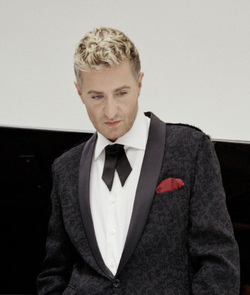
French pianist Jean-Yves Thibaudet clearly enjoys the respect of the classical music world – earning the admiration of audiences, his fellow musicians and even the toughest critics. The New York Times declared, “every note he fashions is a pearl.” London’s Financial Times neatly summed up his playing as “superb.”
Yet, surprisingly, Thibaudet didn’t win such high praise through an old-school emphasis on Beethoven and other Viennese masters. Rather, he’s known for playing an eclectic mix of French, East European and American music – even a little jazz.
Thibaudet turned 50 last year – an age that allows him to look back on a career spanning three decades and also to look forward to new challenges. Last week, he talked about his life and work from his home in Los Angeles.
Q: How long have you been living in L.A., and why did you choose it as your home?
A: I’ve been in Los Angeles for about 15 years, and I love it out here. I was in New York for about 10 years before that, and then I decided the weather was too harsh for me.
Most people work in their home city and travel to other places for holidays. For me, it’s the other way around: I travel to work, and so being at home is my holiday. But in New York I just wasn’t relaxing at all. Here, I find that the pace of life is better. And there’s lots going on here, too. Los Angles has changed a lot in the past 20 years.
Q: This is the 150th anniversary of Debussy’s birth. Is that why you’re playing so much Debussy this year?
A: Debussy isn’t one of those composers who needs an anniversary year to be performed. But I thought it would be nice to pay a special homage and put together an entire recital of his music. It was difficult to decide what to play, though – and with a composer like Debussy you can easily end up doing the most popular pieces that everyone knows. So I included some pieces that aren’t performed as much. I’ve been playing this program quite a bit, and I’m very happy with it.
Q: How would you describe your approach to Debussy and to the repertoire on your recital?
A: There are a lot of different Debussys. The Suite Bergamasque, for example, is very neoclassical; it’s not the impressionist Debussy that everybody knows. But then you have the impressionism of Estampes and also an oriental influence. And then you have the modern Debussy, who’s ahead of his time. The music of the Preludes – especially the second book – is almost esoteric, and you have to make an effort to enter his world. That’s the Debussy who most fascinates me: the Debussy who invented a new language.
Q: You’ve made more than 40 recordings, and you’ve recorded a wide variety of music. But are there any composers whom you don’t intend to record?
A: Everything is just a matter of timing. I certainly wouldn’t say that I have no interest in recording Beethoven or Mozart! They are two fantastic composers, and I do play them in concert. But I’ve never felt it was the right time to record their music.
Nowadays there are so many recordings – and how many do we really need? When you make a recording today, I think you should feel really strongly about your message. Otherwise, it’s just something you do to put on your CV and list on your discography. I don’t want to make a recording today that I won’t be happy with in 20 years.
Q: What new recordings do you have in the works?
A: I want to do an album of my encores. It’s a personal thing: Every pianist has favorite encores. I’ve played a lot of encores – including some gems that most people have never heard of – so I probably have enough of them to make CDs. But I’ll do only one.
Also, I’d love to record an album of solo works of Johannes Brahms – including the big Sonata in F Minor. And I’ve been battling with a record company to record the Piano Concerto of Aram Khachaturian. His own recording was phenomenal, and I think it’s time for someone else to take this piece on.
Finally, I’d like to do another jazz album, and another recording with Renée Fleming, if we can find the right repertoire.
Q: You’re also famous as a fashionable dresser. Is this simply a matter of personal taste, or is there more to it than that?
A: I’ve loved fashion since I was a little boy, and I was always fascinated by the fashion industry.
But 15 or 20 years ago, I felt that classical music had become old-fashioned and too traditional, and it was a complete turnoff for young people. And I asked myself why all the men who play classical music have to dress the same way. The ladies can have the most incredible gowns – and even change halfway through the concert – but the men’s clothes were boring. So I felt it was important to break with the tradition.
I went through an eccentric time, when Versace was doing some of my clothes. Now I tell my tailor not to be too extravagant, but I’ll still wear something that’s just a bit different. In Houston I’ll be wearing a new suit by Vivienne Westwood that’s very beautifully cut.
© Colin Eatock 2012
 RSS Feed
RSS Feed

